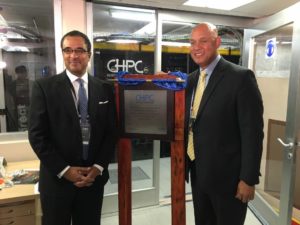
The new Dell supercomputer at CHPC is named Lengau (cheetah)
In HPC news from South Africa today, the Centre for High Performance Computing (CHPC) has unveiled a 1 Petaflop machine from Dell. As the fastest computer on the continent, the new “Lengau” machine was named after the Cheetah and has over 24,000 cores.
For our country to grow at the required rate, as set out in the National Development Plan, it needs to change gear by building capacity in the production and dissemination knowledge,” said Dr Thomas Auf der Heyde, Deputy Director-General: Research Development and Support at the Department of Science and Technology. “The CHPC represents a deliberate move by this country to invest in modernizing our research and development. High-performance computing and advanced data technologies are powerful tools in enhancing the competitiveness of regions and nations.”
 The Dell HPC system is comprised of 1,039 Dell PowerEdge servers, based on Intel Xeon processors totaling 19 racks of compute nodes and storage. It has a total Dell Storage capacity of five petabytes, and uses Dell Networking ethernet switches and Mellanox EDR InfiniBand with a maximum interconnect speed of 56 GB/s.
The Dell HPC system is comprised of 1,039 Dell PowerEdge servers, based on Intel Xeon processors totaling 19 racks of compute nodes and storage. It has a total Dell Storage capacity of five petabytes, and uses Dell Networking ethernet switches and Mellanox EDR InfiniBand with a maximum interconnect speed of 56 GB/s.
Dell is proud to collaborate with South Africa’s CSIR on the delivery of the fastest HPC system in Africa. The Lengau system will provide access and open doors to help drive new research, new innovations and new national economic benefits,” said Jim Ganthier, vice president and general manager, Engineered Solutions, HPC and Cloud at Dell. “While Lengau benefits from the latest technology advancements, from performance to density to energy efficiency, the most important benefit is that Lengau will enable new opportunities and avenues in research, the ability to help spur private sector growth in South Africa and, ultimately, help enable human potential.”
 The key advantages of Lengau are:
The key advantages of Lengau are:
- Effective access for users to compute resources who had limited or no access to the resources in the past due to the capacity constraints
- Effective performance of large scale (i.e. many cores, many teraflops) simulations that were impossible in the past, opening completely new avenues of research
- Effective capacity to build the private sector/non-academic user base of the CHPC for improved national economic benefit to be realized from HPC utilization
When we started in 2007, we took inspiration from the fastest animals in the land and named our first high performance computing system iQudu (Xhosa for Kudu) which boasted 2.5 teraflops (which is 2.5 trillion operations per second),” said Dr Happy Sithole, the Director of CHPC. “In 2009 there was increased demand of computational resources, and a new high performance computing system dubbed the Tsessebe was launched. It boasted 24.9 teraflops and became number 311 on the TOP500 supercomputers, and ranked number one in the African continent. The system was later upgraded to 64.44 teraflops.”
In related news, Happy Sithole will keynote the Dell HPC Community event, which takes place on Monday, June 20 at the Movenpick Hotel in Frankfurt in association withat ISC 2016.



